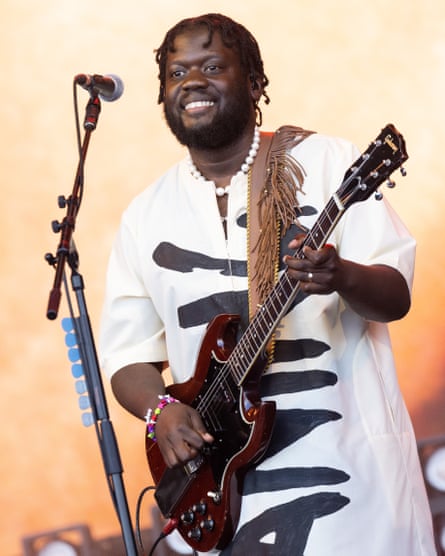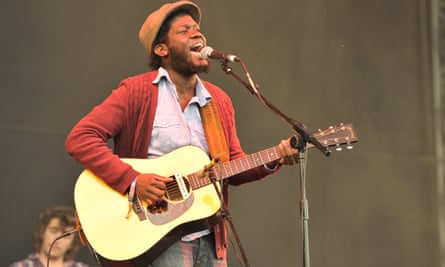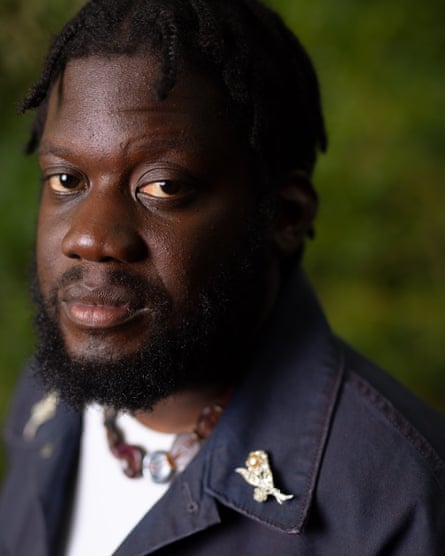At the start of the summer, Michael Kiwanuka played at Glastonbury. A warm-up show in Halifax aside, it was the first gig he had played in Britain for a couple of years, a chance to debut songs from his forthcoming fourth album, Small Changes. A malfunctioning vintage synthesiser notwithstanding, it all went perfectly, the sunshine and a cool breeze somehow potentiating the soft power of the music that floated from the stage: an idiosyncratic cocktail of soul, psychedelia, rock and singer-songwriter introspection that Kiwanuka has honed and reshaped over the 12 years since his debut album into something completely his own.

Kiwanuka and his band sounded as striking as anyone familiar with his back catalogue might expect. But they looked striking, too: Kiwanuka wore a Ugandan kanzu robe with the word “MEANING” emblazoned down the front. This came as more of a surprise. He may have been painted in regal style on the cover of his previous album, the Mercury prize-winning (in 2020) Kiwanuka, but the singer-songwriter is usually as understated as one of his musical heroes, Bill Withers – a man who appeared on the cover of his own debut album outside the factory where he installed aeroplane toilets for a living, holding his packed lunch.
Despite a succession of Top 10 albums and hit singles (the biggest, Cold Little Heart, was boosted to transatlantic platinum status by its use in the US drama Big Little Lies) Kiwanuka can walk into a crowded London bar on a Thursday afternoon without attracting any attention, a state of affairs he seems absolutely delighted by. “I think I’ve been lucky because I haven’t sold, like, millions of albums. I’m not someone who can improve a country’s economy by 5% by doing shows there,” he says, and smiles. “No one really thinks they can make that much money out of me, so you’re left to your own devices a bit.”
Yet there he was, on stage at the world’s biggest music festival, clad not in his familiar dressed-down denims and plaid shirt but a pretty eye-catching ensemble: Kiwanuka tells me a kanzu is the kind of thing you would wear “to a wedding or a posh event, with a jacket over the top” in Uganda. His parents emigrated to Britain from there before he was born, fleeing Idi Amin’s regime.
“I was trying to describe and show who I am through clothes, and express my full self,” he says. “I wanted to show on this huge stage what it is I am, and that I’m proud of it. I thought it would be really cool to take something Ugandan and give it my own spin [with English lettering], that describes my heritage the way it really is. I’m Ugandan, but I’ve lived through the lens of the UK and the west, and I’m British. I wasn’t sure how it would be received. It was really cool that people noticed it.”
He wouldn’t have done this earlier in his career. “No way, man – I was too busy trying to fit in. If anything, I just wanted to talk about my western influences, and just be part of the club, you know? I just wanted to be accepted by my peers and people I respected. There weren’t that many Ugandan, African artists doing the music I was making.” But as Kiwanuka started putting out one great record, then another, he found “the confidence to be me. To be a Black British Ugandan playing an electric guitar or an acoustic guitar, playing some indie songs, but then also playing some soul, 70s-inspired songs, Pink Floyd-inspired songs, doing long songs, doing songs that talk about being Black, or that talk about love or faith … there’s no boundary. But, you know, that took a long time.”
You can see why Kiwanuka might have exercised a degree of caution. He says he was initially encouraged by his label to release his music under a pseudonym, for fear that his surname would cause audiences to assume he was a traditional African artist – although, as he points out with admirable equanimity, this was “15 years ago, before Laura Mvula or Jalen Ngonda”, when there weren’t many African surnames visible in mainstream rock and pop. And you can see why the subject of identity keeps cropping up in his songs, most famously on 2016’s mantra-like Black Man in a White World. It’s there again, less directly, on Small Changes.
A track called Lowdown offers a semifictional depiction of the angsty, youthful Kiwanuka, a skateboarding “slight weirdo” in Muswell Hill, north London. He was trying to make his way in a succession of teenaged bands, aware that, as he puts it, “those type of bands didn’t have Ugandan kids in them. When I got home from school and put on MTV2, it was all white men, and the Black males were doing modern R&B. So when you’re making that music as a kid, you think: does this even make sense?” As if to underline the point, the song initially bears the distinct melodic influence of Blur, before unspooling in a burst of David Gilmour-esque guitar soloing. He would once have shied away from using influences like these in his music, he says, until he realised that “there’s space for everyone; that being more myself, there’s a place for that, as there is for everything. And if I’m trying to be someone else, there’s no point any more.”
After the teenage indie bands, he was accepted on to “quite a prestigious” jazz course at the Royal Academy of Music, but quit after realising that the staff “were looking at music in a very specific way that I thought was a little too rigid for me, a very European feel and rhythm and harmony that just didn’t prick my ear. I don’t think a lot of young Black British boys or girls would have been understood there.”

He worked as a session musician but was signed by a major label off the back of singing his own songs at open mic nights. “It was nerve-racking getting up there,” says Kiwanuka, “but once I actually started playing, I could disappear into the feeling I had when I wrote the song.” Even with a deal under his belt, he felt unsure. Aside from the stuff about his surname, and narrowminded concerns about where a Black singer-songwriter who loved alt-rock as much as he loved classic soul fitted into the musical landscape, there was his label’s surprising enthusiasm for a song he had written about his Christian faith: I’m Getting Ready. He only took it to them because he had run out of material for his debut album and was horrified when they suggested releasing it as a single.
“I was very, very nervous. I thought: how’s this going to get on Radio 1?” he says. “You still think you’re in year nine, getting laughed at. Singing about my faith and beliefs was scary because if someone disagrees with it, it’ll be hard. I want to be cool, I want to fit in. I thought it was something that would just turn everyone away, and you make music to connect.” His worry was compounded by the fact that Christianity “hasn’t always acted in the best way towards people. You don’t want to bring up any of that pain, or make people feel like you agree with any of that. But as I got older … you are who you are, aren’t you? And if you know you’re not hurting people and there’s no hate or malice to it, it’s OK.”
Now Kiwanuka sees more people searching for a belief system. “Having a faith in things now is, I think, a lot more acceptable, whatever faith it is. There’s no dogma, necessarily. We’re connected by the struggles we have and I think that’s what I’m singing about – being a human being and trying to overcome, which is what we’re all doing in a way.”
His 2012 debut album Home Again was a success, but there’s a sense that Kiwanuka really began to find himself when he teamed up with producers Brian “Danger Mouse” Burton and Dean Cover, better known as Inflo, for 2016’s Love & Hate. The former was already a big name when Kiwanuka was introduced to him – “I thought, I probably can’t afford him.” The latter was virtually unknown, although he was formulating a fairly mad-sounding plan for a kind of anonymous, genre-smashing supergroup: Sault, which emerged in 2019 and helped to turn the enigmatic Inflo into a producer sought out by everyone from Adele to Belle and Sebastian. “He had it from the beginning, straight away; how it is now, that’s how he envisaged it,” says Kiwanuka, who appeared (uncredited) on Sault’s albums and took part in the collective’s wildly acclaimed show in London at the end of last year.
The trio hit it off, working together on Kiwanuka’s songs, an arrangement he concedes is “very odd” but that somehow works “even when we don’t even want to, or try”. The relationship continues on Small Changes, an album Kiwanuka says is “way more understated … more stripped back” than its predecessor, despite the presence of some heavyweight guest stars. At one point during its recording, Kiwanuka found himself fronting an ad-hoc band that featured legendary session bassist Pino Palladino and equally legendary producer Jimmy Jam, of Jam and Lewis fame – who dropped by the studio, regaled everyone with stories about his time working with Prince, then jumped in to play organ.
The album’s airy, stripped-back sound is down to confidence, too, says Kiwanuka. He thinks this has something to do with becoming a father: he and his wife, Charlotte, have two young boys. “You haven’t got loads of time, so you have to make decisions … you have to know who you are.” And you have to be ready for the annoyingly insistent questions that kids ask. “You’ve got to answer to people about what you’re saying – if that’s going to young ears, ‘I don’t know’ doesn’t really cut it. So when you write, you’ve got to be really aware: do I really want to say this and can I stand by it?”

It’s no bad thing, he says. “I wish I always thought like that, in my teens and 20s. If not, don’t do it. It affects you musically, and especially lyrically. It goes across to videos, what you’re wearing, what you want to say. Everything is heightened, which is good.”
Perhaps having kids has also made him think about his own childhood. He has developed a philosophy based around the period before your teens, when you love music in a guileless, open way, unbothered by genre boundaries, or what your peers like, or what liking a certain kind of music says about you. “Then you get told what the boundaries are by the media or whatever is around you and you start to believe a lie, essentially. Think about impostor syndrome – for that to happen, you have to feel like there’s a door that you’re allowed to go in and out of. If you realise those doors shouldn’t – or don’t – exist, you can’t impose any more. You’re free to go anywhere. Stay inspired, stay vibrant – just be open, like an eight- or 12-year-old. It’s the hardest thing, but that’s how you keep yourself excited.
And that,” he concludes, “is how you make nice music.”
Source: theguardian.com


